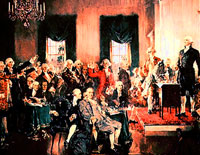 |

Trust: Principles of Disinterestedness
 |
T he Founding Fathers of the United States were very concerned about trust and mutual respect and the leadership of the country they had just created.
 Among the drafters of the United States Constitution meeting in Philadelphia in 1787, Baron Charles de Montesquieu’s seminal work, The Spirit of Laws, was no doubt required reading. The concept of the separation of powers, developed here and influenced by the work of the Greek historian Polybius, surely formed the basis of the Constitution. Called the “most comprehensive and piercing genius of his age,” he was certainly one of the most respected and influential analysts of his time. Among the drafters of the United States Constitution meeting in Philadelphia in 1787, Baron Charles de Montesquieu’s seminal work, The Spirit of Laws, was no doubt required reading. The concept of the separation of powers, developed here and influenced by the work of the Greek historian Polybius, surely formed the basis of the Constitution. Called the “most comprehensive and piercing genius of his age,” he was certainly one of the most respected and influential analysts of his time. Montesquieu explored this relationship which must exist between a people and their government – between leaders and followers – without which they could not survive. He weighed the advantages and disadvantages of dictatorships, monarchies and republics, describing the cohesive forces of each. Although he felt that the free republic was the most desirous form of government, he stated that it was the most fragile because it depends on a virtuous people. The framers of the Constitution took that to mean those that could sacrifice their private concerns for the good of the country. Of this quality of being they had grave concerns. Montesquieu explored this relationship which must exist between a people and their government – between leaders and followers – without which they could not survive. He weighed the advantages and disadvantages of dictatorships, monarchies and republics, describing the cohesive forces of each. Although he felt that the free republic was the most desirous form of government, he stated that it was the most fragile because it depends on a virtuous people. The framers of the Constitution took that to mean those that could sacrifice their private concerns for the good of the country. Of this quality of being they had grave concerns.
 Washington concluded, that “the few, therefore, who act upon Principles of disinterestedness are, comparatively speaking, no more that a drop in the Ocean.” We feel this lack of such leadership today. Good leaders should feel an obligation to not only consider their personal well being but also that of others as well. When this implicit commitment a leader makes with their followers is broken – when the leader only considers their own well being – there is no basis for leadership and the leader cannot be trusted. Washington concluded, that “the few, therefore, who act upon Principles of disinterestedness are, comparatively speaking, no more that a drop in the Ocean.” We feel this lack of such leadership today. Good leaders should feel an obligation to not only consider their personal well being but also that of others as well. When this implicit commitment a leader makes with their followers is broken – when the leader only considers their own well being – there is no basis for leadership and the leader cannot be trusted.
 Suspicion not trust is the operative word today. Trust, however, is an essential ingredient of the leader follower relationship. An ingredient that is in short supply. Trust of course, involves an inevitable vulnerability on our part, due to some form of ignorance or basic uncertainty as to the other person’s motives. This is a leap of faith that many of us today, are not willing to make. But a leap we must make because leadership Suspicion not trust is the operative word today. Trust, however, is an essential ingredient of the leader follower relationship. An ingredient that is in short supply. Trust of course, involves an inevitable vulnerability on our part, due to some form of ignorance or basic uncertainty as to the other person’s motives. This is a leap of faith that many of us today, are not willing to make. But a leap we must make because leadership doesn’t and can’t happen in a vacuum. doesn’t and can’t happen in a vacuum.

Back to Leadership Minute Home Page.
|
|




 Montesquieu explored this relationship which must exist between a people and their government – between leaders and followers – without which they could not survive. He weighed the advantages and disadvantages of dictatorships, monarchies and republics, describing the cohesive forces of each. Although he felt that the free republic was the most desirous form of government, he stated that it was the most fragile because it depends on a virtuous people. The framers of the Constitution took that to mean those that could sacrifice their private concerns for the good of the country. Of this quality of being they had grave concerns.
Montesquieu explored this relationship which must exist between a people and their government – between leaders and followers – without which they could not survive. He weighed the advantages and disadvantages of dictatorships, monarchies and republics, describing the cohesive forces of each. Although he felt that the free republic was the most desirous form of government, he stated that it was the most fragile because it depends on a virtuous people. The framers of the Constitution took that to mean those that could sacrifice their private concerns for the good of the country. Of this quality of being they had grave concerns.